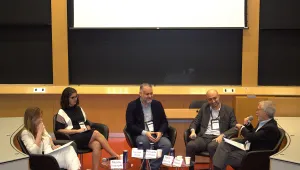BCSIA: 1996-1997 ANNUAL REPORT
1. Overview
In 1996-97 the Center for Science and International Affairs was reendowed, refurbished, and renamed the Robert and Renée Belfer Center for Science and International Affairs. This was the fourth major step in the history and evolution of the Center. Founded by Paul Doty in 1973 as the Program for Science and International Affairs within the Faculty of Arts and Sciences, its original goal was to revive serious analysis of nuclear dangers and arms control. Five years later, a major grant from the Ford Foundation made possible the establishment of the Center for Science and International Affairs (CSIA) as the first permanent research center at the newly emerging John F. Kennedy School of Government. In 1990 the Center expanded to incorporate two new research programs: the Environment and Natural Resources Program and the Science, Technology, and Public Policy Program.
Today, the Belfer Center is the hub of the John F. Kennedy School of Government''s research, teaching, and training in international security affairs, environmental and resource issues, and science and technology policy. The Center''s mission is to provide leadership in advancing policy-relevant knowledge about the most important challenges to international security and other critical issues where science, technology, and international affairs intersect. It does so by integrating the insights of social scientists, natural scientists, technologists, and practitioners with experience in government, diplomacy, the military, and business to address critical issues.
The generous gift of Robert and Renée Belfer has positioned the Center to succeed in its ambitious mission in the decades ahead. Yet the Belfer gift builds on strong foundations. Paul Doty, the Center''s first Director (1973-84), established CSIA as the nation''s most effective and important institution for training in international security studies, an achievement evinced by continuing distinction of the Center''s alumni group. Under Director Joseph S. Nye (1984-90), the Center maintained its focus on training and research in security studies, but also broadened the conception of security to include more social and economic dimensions, particularly in the context of the Avoiding Nuclear War Project. The Center had one of its finest moment of policy impact under its third Director, Ashton B. Carter (1990-93), when its work on the collapse of the Soviet Union made a material contribution to the landmark Nunn-Lugar legislation. The fourth Director, William Clark (1993-94), developed the research programs on the environment and science and technology policy as equal pillars within the Center, comparable in resources and excellence to the long-standing International Security Program.
Under the leadership of Director Graham T. Allison, the Center has entered into its most rapid period of growth, first with the addition of the already-established Strengthening Democratic Institutions Project, and then with the dramatic expansion made possible by the Belfer gift. In 1995-96 John Holdren joined Harvard''s faculty and took the reins of the Science, Technology, and Public Policy Program, which itself has entered a period of unprecedented growth. Ash Carter returned to the Center after four years of distinguished government service. Matthew Meselson, a prominent biochemist from the Faculty of Arts and Sciences, has joined the Center to lead a renewed research project on the threat of chemical and biological weapons. Shai Feldman, one of the foremost thinkers on the security of the Middle East, became a member of the Center''s research staff. The Center''s physical space was thoroughly renovated, its information infrastructure modernized, and the core staff responsible for managing this growing enterprise significantly enhanced.
Most important, the Center has established a new Board of Directors to oversee its research, training, and policy-impact activities. Meeting weekly, the Board consists of the Center''s senior faculty and staff members who are responsible for directing major research projects. Chaired by Graham Allison, the 1996-97 BCSIA Board of Directors included: Robert Blackwill, Harvey Brooks, Provost Albert Carnesale, Ashton Carter, William Clark, Paul Doty, Richard Falkenrath, Shai Feldman, John Holdren, Henry Lee, Ernest May, Matthew Meselson, Steven Miller, and Joseph Nye. As the focal point of the Center''s intellectual leadership, the Board of Directors takes collective responsibility for the activities of the Belfer Center.
The Center pursues its mission in four complementary, highly intermingled research programs.
The International Security Program (ISP) addresses the most pressing threats to U.S. national interests and international security, analyzing the forces that shape these problems and identifying opportunities for effective intervention in the policy process.
The Environment and Natural Resources Program (ENRP) is the locus of Harvard''s interdisciplinary research on resource and environmental problems, and policy responses.
The Science, Technology, and Public Policy Program (STPP) analyzes ways in which science and technology policy influence international security, resources, the environment, and development, as well as such cross-cutting issues as technological innovation and information infrastructure.
The Strengthening Democratic Institutions Project (SDI) catalyzes support for three great transformations in Russia, Ukraine, and the other republics of the former Soviet Union: to sustainable democracies, free market economies, and cooperative international relations.
Each research program encompasses a community of Harvard faculty, practitioners, and every year a new, international, interdisciplinary group of fellows. In total, well over 100 people are either employed by or are closely affiliated with the Center. Their research products, closely tied to the Center''s training mission, are published and disseminated as books, journal articles, briefings of officials and journalists, newspaper articles, op-ed pieces, and private memos. The Center''s own vigorous publications program handled many of the Center''s research products, particularly those produced by the International Security Program. The Center''s work is enriched by a large and diverse program of seminars, workshops, discussions with distinguished visitors, and major conferences.
This Annual Report, the first as the Belfer Center for Science and International Affairs, describes the activities and accomplishments of the Center in 1996-97. The first four sections, following the Director''s Foreword, detail each of the Center''s component programs. The fifth section lists all of the events sponsored by the Center. The sixth section offers a list of publications written by or produced by the Center''s staff. The seventh section provides the biographies of all resident BCSIA faculty, staff, and fellows in 1996-97. The eighth section lists BCSIA''s associate fellows. The financial annex to this Report has been prepared separately.
Go to:
OverviewDirector''s Foreword
International Security ProgramScience, Technology, and Public Policy Program Environment and Natural Resources Program Strengthening Democratic Institutions Project BCSIA Events BCSIA Publications Biographies Associate Fellows



